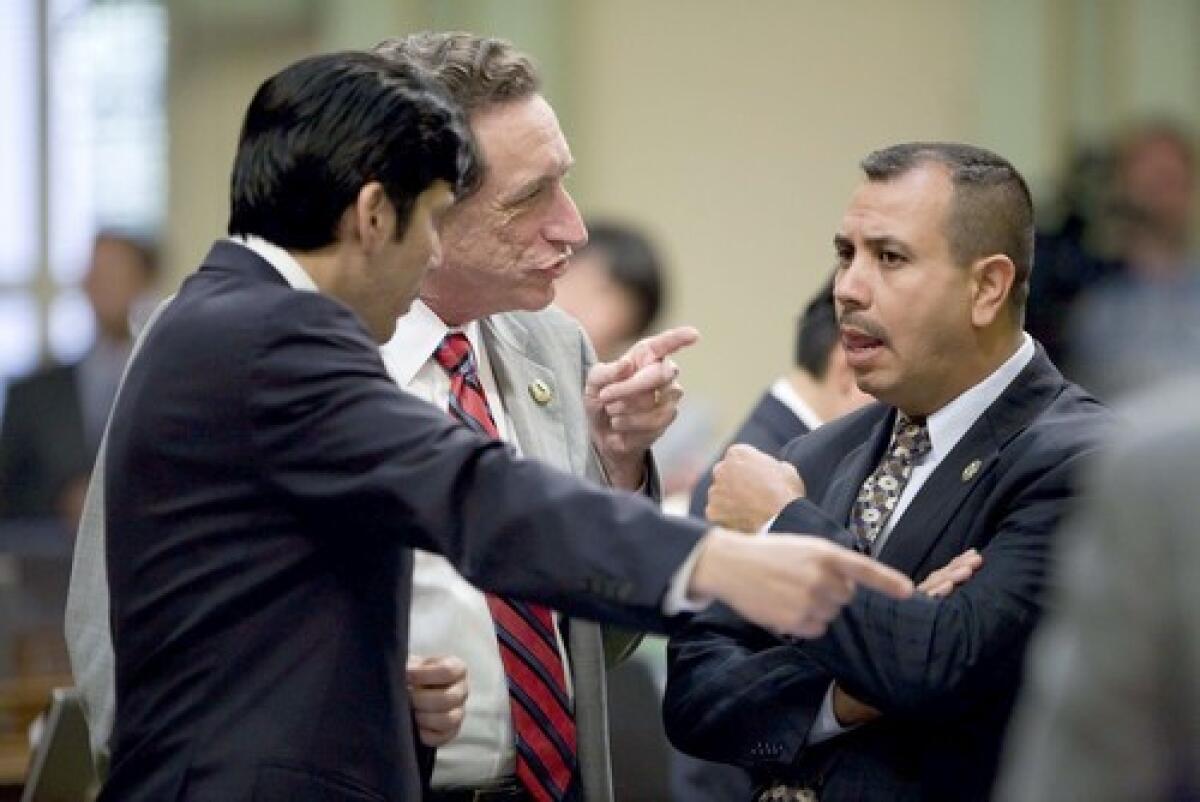State budget negotiations were anything but smooth

- Share via
Reporting from Sacramento — It was long into the wee hours of Friday morning, and the state Senate was teetering near deadlock on bills to close a $26-billion budget deficit when lobbyists for the software company Intuit approached Senate leader Darrell Steinberg.
For several years, lobbyists for the company had been trying to kill a state program that allows some California residents, mostly low-income taxpayers, to have the state tax board fill out their tax returns for free -- competition for Intuit’s popular TurboTax software.
Now, as they stood in a hallway outside the ornate Senate chamber, the lobbyists asked Steinberg (D-Sacramento) to insert a provision into the budget bills that would dismantle the free tax-preparation program. “They were interested in, you know, a bill,” Steinberg said a few hours later. Some Republican lawmakers had suggested that if that happened, they would be more amenable to voting for a key part of the budget plan.
State leaders had hoped that a marathon final meeting of the Legislature before members left on summer recess would finally mark a clear triumph over the legislative dysfunction that has left lawmakers seemingly unable to address the state’s epic financial problems.
Instead, the 24-hour session leading up to final passage of the budget Friday afternoon turned into a slow-moving train wreck.
The power of Sacramento lobbyists was only one of several factors threatening to bring the Legislature to a halt. Steinberg turned aside the proposal from Intuit’s representatives. But lobbyists for major interest groups were present throughout the night, seeking to influence the process. With hundreds of pages of legislative language passed with little time available for review, few knew what the fine print might contain.
Early proclamations that the cash crisis had forced lawmakers to transcend pettiness and partisanship devolved into hallway deal-making. Over and over, legislators with designs on higher office balked at measures that could be used in campaigns against them. Legislative leaders, inexperienced in their jobs, repeatedly found they could not deliver the votes of their caucuses.
Term limits have made this batch of lawmakers among the most inexperienced in decades, and many legislators, their attention focused on their next elected office, spent the night watching the moves of real or prospective opponents in upcoming primaries.
The budget package was sliced into 30 bills, largely to allow lawmakers to cherry-pick which elements they would be willing to support. Those candidates running for the office of state superintendent of public instruction, for example, could oppose education cuts. Those contemplating a run for attorney general could fight public safety reductions.
“Any time you have members running for higher office, it makes things tough,” said Assemblyman Mike Villines (R-Clovis), the former GOP leader in the Assembly, who plans to run for state insurance commissioner.
About 2:30 Friday morning, Sen. Mark De Saulnier (D-Concord), a candidate for Congress, helped stall one element of the package that would have taken roughly $1 billion in local government transportation funds and used it to reduce the deficit. The move had been bitterly opposed by mayors and other local government officials.
The bill stalled on a vote of 20 to 20, with De Saulnier opposed. As Steinberg and Senate Republican leader Dennis Hollingsworth (R-Murrieta) scrambled to come up with the one necessary vote, some senators suggested that Democratic Lt. Gov. John Garamendi use his constitutional authority to break the tie. That would also have saddled Garamendi with the political baggage of cutting transportation. Garamendi is De Saulnier’s opponent in the primary for the congressional race.
Eventually, Sen. Ellen Corbett, a Democrat from the East Bay town of San Leandro, switched her vote, allowing the bill to pass. Hours later, however, the transportation bill was defeated in the Assembly, leaving the effort to balance the budget $1 billion short.
Not long after the transportation bill came up in the Senate, the budget package encountered trouble again. This time, a handful of lawmakers blocked another provision deeply opposed by local government officials: borrowing $1.9 billion from local government revenues and then paying it back in future years. Members of the Democratic caucus were buckling under pressure from local leaders but had not come up with workable alternatives.
At 3 a.m. Friday, visibly weary from hours of arm-twisting, Steinberg lifted his microphone. “I don’t have much left here,” he sighed.
“If you think the deal is a bad deal, and you believe that your responsibility to solve this problem is as great as your concern over some of what your local elected officials are going to say . . . then please come forward with the way you would make up $1.9 billion,” Steinberg said.
In the past, legislative leaders such as Democrats Willie Brown and John Burton and Republican Jim Brulte had considerably more leverage over members. Today’s leaders, however, are termed out before they can consolidate power.
As a result, they routinely turn to one of the few weapons they have left: sleep deprivation. Overnight lockdown sessions are becoming the norm with budgets. Meetings start before bills have been vetted by the Legislature’s legal staff, leaving lawmakers to wait in the dead of night to see the specific language they are being asked to vote on.
Not that the leaders didn’t have their moments. When the Senate finally finished its all-night session, shortly before 6:30 Friday morning, the Assembly was still voting and Republicans in the lower chamber were demanding revisions in bills the Senate had passed.
Rather than allow negotiations to reopen, Steinberg preempted the Assembly by declaring the Senate closed for recess. Soon he was boarding a plane for a vacation in Hawaii.
shane.goldmacher
@latimes.com
Times staff writer Michael Rothfeld contributed to this report.
More to Read
Sign up for Essential California
The most important California stories and recommendations in your inbox every morning.
You may occasionally receive promotional content from the Los Angeles Times.














